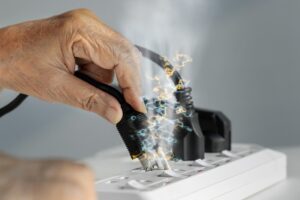 One of the biggest misconceptions about power surges is that they only occur due to lightning storms, and you really don’t need to worry about them outside of storm season. Unfortunately, this just isn’t true.
One of the biggest misconceptions about power surges is that they only occur due to lightning storms, and you really don’t need to worry about them outside of storm season. Unfortunately, this just isn’t true.
On the contrary, power surges are caused by and impact the electrical appliances and equipment in your home. You can have dozens of small power surges in your home a week and not even know it! And since homes have more precise electrical equipment in them than ever before, it’s important to be aware of this.
You likely have multiple devices connected to your home’s power supply at any time, right? You probably also have a number of charging stations to manage your family’s smartphones and other devices. If you want to protect all these devices, then it’s important to know what a power surge really is and how its voltage can impact your home. And before you tell us you’re not worried because you have power strips in place–that’s not the most ideal solution. Read on to learn more!
What Does It Mean to Have a Power Surge?
Power surges are also called voltage spikes, and they happen where there’s a sudden increase in voltage through an electrical system. A surge can actually melt wires and cause fuses to blow or circuit breakers to trip (if you still have a fuse box, actually, it’s time for you to upgrade your electrical panel!) As we mentioned above, people often think of lightning strikes being the main cause of a power surge. Lightning strikes definitely can cause power surges, but there are other sources, too. Problems in a local power plant can cause them, as can the very appliances within your home.
In fact, most power surges come from inside the house. When a powerful electrical appliance turns on, like your AC system, it can create an imbalance in the electric current, which creates power surges. Have you ever notices that the lights in your home flicker suddenly when your air conditioner or even the compressor in your refrigerator kicks on? This is the result of a power surge.
Power Strips: One Layer of Protection
Power strips are certainly still a safe alternative when compared to the older octopus plugs that allow for multiple appliances to plug into a single outlet. Power strips contain their own circuit breakers, so if there is a voltage spike, the strip shuts off power to prevent damage to the appliances that are plugged into it.
We definitely suggest that you use power strips around your home, but, it’s important to remember that this is just one layer of protection against the biggest of power surges. A massive power surge, after all, can overcome a power strip, and many of the lesser surges won’t cause them to activate, allowing for cumulative damage to happen.
So what’s the answer? A whole-home surge protection system! Our professional electricians can install this right into the electrical panel for your home for widespread protection.
To get in touch with a professional electrician in Hendersonville, TN, look no further than Covenant Heating and Cooling. Contact us today!
